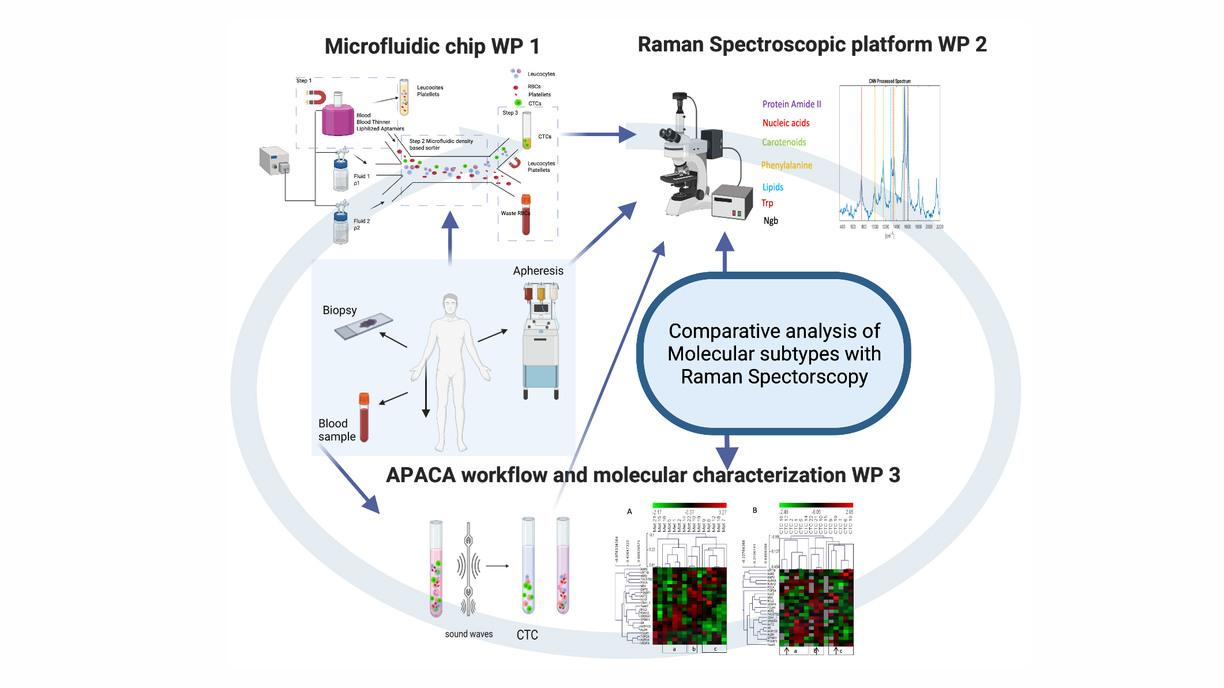
Early detection of prostate cancer by analysis of circulating tumor cells
Metastases and spread of the tumor outside of the prostate are the prominent and leading cause of morbidity and mortality for prostate cancer (PC) patients. Today, there are no available cures. The project “Isolation and analysis of circulating tumor cells for prostate cancer detection in whole blood by Raman spectroscopy – MiRa” develops and investigates a new method of detecting the cancer in an early stage.
Metastasis occurs if the primary tumor sheds circulating tumor cells (CTC) into the peripheral blood circulation system. The detection of CTC in blood has the potential to reveal molecular details that can be detected by Raman spectroscopy. The gene expression of the cancer phenotype opens the door for personalized therapy and possibly for a higher survival rate, which fits well into one of the pillars of PRECISE – to develop accurate tools for early diagnosis and monitoring. Furthermore, detection and analysis of CTC can be used as liquid biopsy.
In this project we will:
- Develop a microfluidic system to separate and capture the CTC
- Investigate CTC and their gene expression by online Raman spectroscopy, with direct visualization of the results
- Investigate the potential of the gained knowledge to optimize MiRa into a clinical tool for precision medicine.
MiRa has the potential to find minute individual molecular changes of the amino acids of DNA, proteins or lipids. The aim of MiRa is to achieve fast and accurate liquid biopsy and personalized treatment of prostate cancer.
Projekt team
Project leader Kerstin Ramser, Professor in Experimental Mechanics and expert in Raman spectroscopy at Fluids and Experimental Mechanics, Department of Engineering Sciences and Mathematics, LTU. Kerstin Ramser has long time experience in Raman spectroscopy on cancer tissue and single cell studies and has ongoing collaboration with many national and international labs. This group has a well-equipped optics lab and expertise in signal analysis, including deep learning and convolutional neural networks.
Jasmina Casals-Terré, Assistant Professor in the subject Fluids and Experimental Mechanics at the Department of Engineering Sciences and Mathematics at LTU and Professor leading the MicroTech lab at the Mechanical Engineering Department, Technical University of Catalonia-Barcelona (UPC) in Spain. Jasmina Casals-Terré has expertise to do microfluidics chip design and manufacturing, she has been working of particle cell separation. She is currently applying her microfluidic cell separation principle for breast cancer tumorous cell sorting in collaboration with Spanish company External link. and Spanish hospitals.
External link. and Spanish hospitals.
The MicroTech Lab applies the power of miniaturization to create revolutionary micro/nanofluidic new devices and has micro manufacturing capabilities, see https://upcfabterrassa.upc.edu/ca/digital-lab External link. and characterization capabilities (https://multiscale.upc.edu/en
External link. and characterization capabilities (https://multiscale.upc.edu/en External link.)
External link.)
Andreas Josefsson, Associate Professor in Urology and translational cancer research as group leader at Wallenberg Centre for Molecular Medicine (WCMM), Umeå University (UmU). Andreas Josefsson has expertise to do rapid patient to protein and nucleic acid level analysis as well as longer term model systems. He has a large network of collaborations covering many aspects of prostate cancer research. The APACA-study lead by Andreas Josefsson is a prospective biomarker trial to develop a workflow for high yield isolation of circulating tumor cells for precision medicine. Apheresis is performed in the same building, acoustophoresis is performed by AcouWash (AcouSort®). WCMM at UmU has a fully equipped lab and AJ has access to 10x genomics to perform single cell libraries. Read more here. External link.
External link.
Amir Mohammadimehr Phd student, Mechanical Engineering Department in Technical University of Catalunya (UPC) doing research on CTC isolation based on density based separation methods under the supervision of Jasmina Casals-Terré.
Dirce Pineda Vazquez PhD student at Experimental Mechanics will be the link that brings the different part together, she will work with both Raman spectroscopy, microfluidics and the software to generate online results.
Contact
Kerstin Ramser
- Professor
- 0920-491648
- kerstin.ramser@ltu.se
- Kerstin Ramser
Jasmina Casals-Terré
- Adjunct Professor
- 0920-49
- jasmina.casals-terre@ltu.se
- Jasmina Casals-Terré
Updated:
